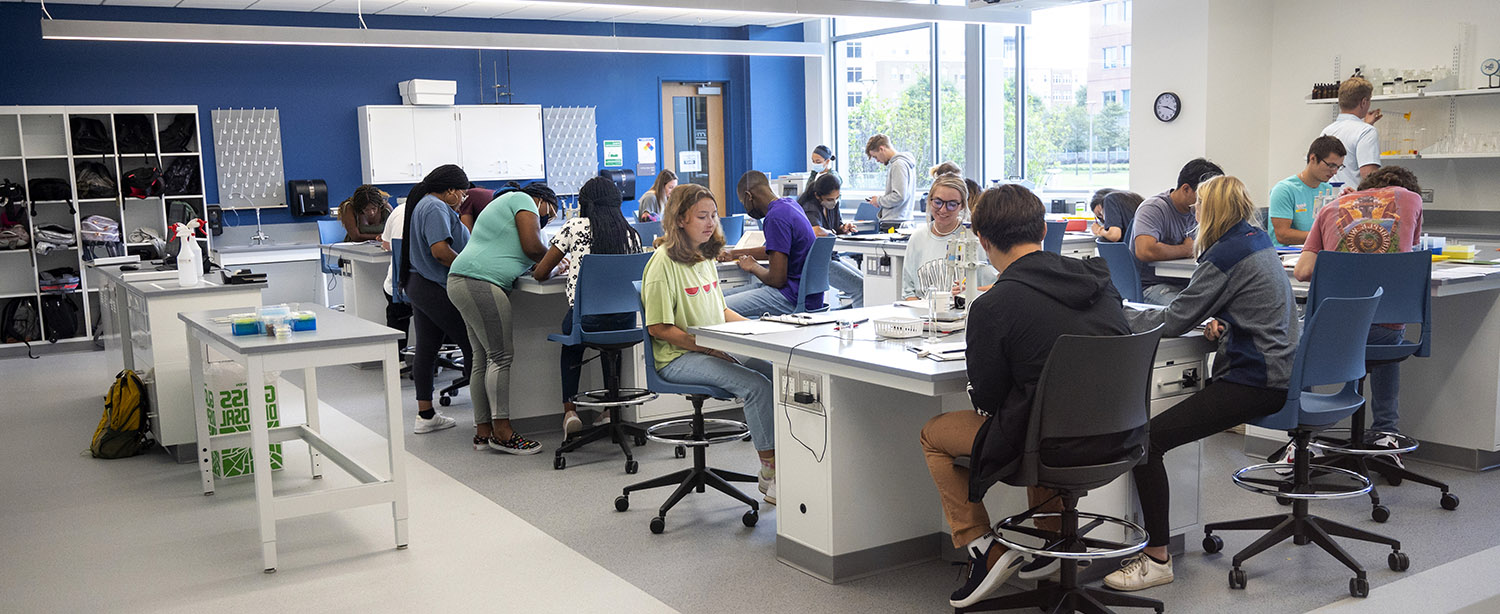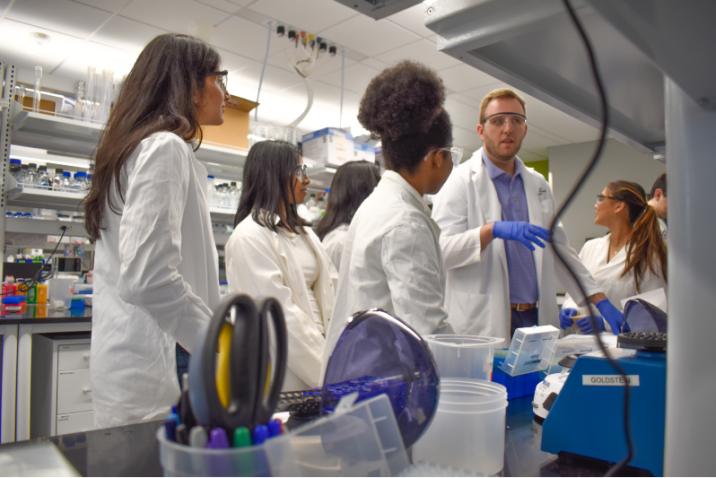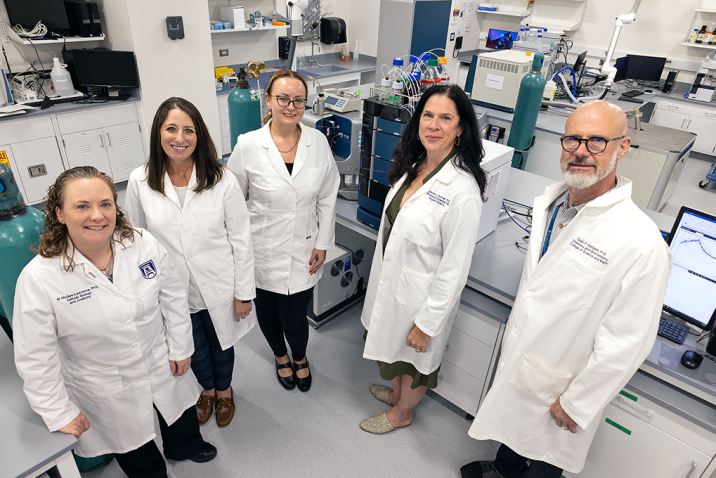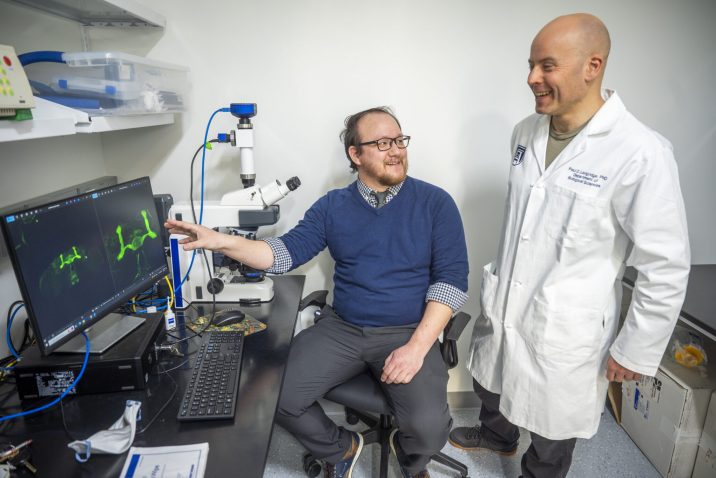Creativity, Discovery, Engagement
Ignite Your Curiosity

Research in Physics
We strive to be at the forefront of many areas where new physics can be found. While we often study the simplest things, such as individual atoms, we study the most complicated things too: unusual materials like high temperature superconductors and those that are important in biology. By pushing the limits, we have the chance to observe new general principles and to test theories of the structure and behavior of matter and energy.
Research in the department covers a wide range of fields, including AMO physics, biological physics, condensed matter physics, high energy physics, particle astrophysics, and gravitational physics. Many opportunities are available for both graduate and undergraduate students.
Contact Us
Department of Physics and Biophysics
Health Sciences Campus
Science & Mathematics Building
706-721-2335
Research Areas
Our faculty have diverse specializations and research interests, and they’re passionate about working with undergraduate as well as graduate students. This includes advising and mentoring throughout your time at AU, as well as partnering with you on gaining research experience.
Applied Research
Research typically involves designing and testing instruments and devices necessary for various interdisciplinary investigations, such as environmental sensors. Projects involve learning about analog and digital electronic circuits and how to write microcontroller software appropriate for the topic of investigation.
Faculty: Dr. Andy Hauger, Dr. David McCall
Atomic and Molecular Physics
Understanding basic phenomena ranging from the few-body to the many-body level. Included are processes such as the behavior of quantum gases (such as Bose-Einstein condensates) and degenerate (Fermi) gases, and Bose-Fermi mixtures, which connect with modern-day condensed-matter physics.
Faculty: Dr. Tom Colbert (Experimental), Dr. Theja DeSilva (Theoretical)
Biological Physics
Experimental research focuses on biological applications of physics, particularly on the damages done to DNA by ultraviolet and ionizing radiations, as well as post-irradiation effects on cells. We look at spectroscopic studies of proteins, nucleic acids, and other biologically important molecules using visible and ultraviolet light. The theoretical subset of Biological Physics involves studying biological phenomena using computational and theoretical approaches, based on physics, to gather insights into the underlying physical principles for how cells and tissues carry out their functions. We look at collective cell movement during embryogenesis and tumor growth, and how cells sense their mechanical environment.
Faculty: Dr. John Sutherland (Experimental), Dr. Theja DeSilva (Theoretical), Dr. Trinanjan Datta (Theoretical)
Condensed Matter Physics
Looks at the physical properties of condensed phases of matter where particles adhere to one another. We seek to understand the behavior of these phases by using physical laws, including the laws of quantum mechanics, electromagnetism, and statistical mechanics. At Augusta University, we do research into microfluidics and electrified jets, quantum magnetism, strongly correlated electron systems, and high-temperature superconductors. On the theoretical and computational front we utilize a variety of tools ranging from interacting spin wave theory, Schwinger boson, Monte Carlo simulation, exact diagonalizaton, and Density Matrix Renormalization Group (DMRG).
Faculty: Josefa Guerrero-Millan (Experimental), Dr. Amani Jayakody (Experimental), Dr. Theja DeSilva (Theoretical), Dr. Trinanjan Datta (Theoretical and Computational)
Cosmology and Gravitational Physics
Cosmology is a broad field of study that focuses on the origin, evolution, and structure of the universe. In cosmology, we seek the answers to the most fundamental questions about the universe. The questions encompass the structure of space-time geometry to the origin of fundamental particles from quantum fields and their interactions in the primordial universe. Gravitational Physics is a classical theory that studies gravitational interactions at the cosmological and astrophysical scale, primarily based on Einstein's general theory of relativity. The two key questions that modern gravitational physics research attempts to answer are: Is Einstein's general relativity the complete theory of gravity at the IR scale? What is the interaction between gravity and matter at the UV scale, and how does such quantum theory of gravity incorporate general relativity? The possibility that an alternative theory of gravity like Conformal Gravity could achieve both the complete theory of gravity and the complete cosmological model of our universe remains open.
Faculty: Dr. Asanka Amarasinghe
Magnetic Resonance Imaging (MRI) Physics
At the interface of physics, biology, chemistry, computer science and data science, magnetic resonance imaging (MRI) physics touches nearly every aspect of STEM. The faculty explores many forms of research including (but not limited to) analysis of neurofunctional MRI data, advancements in MRI protocol and algorithm development, as well as the design and construction of novel MRI hardware for the study of MR physics at a fundamental level.
Faculty: Dr. Nathan Yanasak , Dr. Alex Wright, Dr. Genevieve Reeves
Medical Physics
Researches the technical foundations of radiation, dosimetry, and nuclear medicine. Medical physics incorporates experimental, computational, and theoretical methods to study the effect of ionizing and non-ionizing radiation in the diagnosis and treatment of diseases.
Faculty: Dr. Nathan Yanasak, Dr. Joseph Newton
Nuclear Astrophysics
A branch of astronomy that looks at the physical nature of stars and other celestial bodies, and seeks to apply the laws and theories of physics to the interpretation of astronomical observations. Studies protons and neutrons at the center of an atom (nuclei) and the interaction that hold them together in space. We also do research into other forms of nuclear matter.
Faculty: Dr. Joseph Newton
Physics Education and Technology
Physics education research (PER) refers to the methods currently used to teach physics and to an area of pedagogical research that seeks to improve those methods. The Scholarship of Teaching and Learning (SoTL) uses discovery, reflection, and evidence-based methods to research effective teaching and student learning. These findings are peer-reviewed and publicly disseminated in an ongoing cycle of systematic inquiry into classroom practices.
Faculty: Dr. Tom Colbert, Dr. Trinanjan Datta, Dr. Theja DeSilva
Statistical Physics
Statistical physics aims to explain the behavior of macroscopic systems by analyzing the statistical properties of their microscopic constituents. Our research in this area investigates both classical and quantum systems with many interacting components to uncover their macroscopic properties, phases, and phase transitions. We employ a variety of methods—including machine learning techniques, computational approaches such as classical Monte Carlo simulations, collective transport models, quantum information theory, and other analytical and computational frameworks to study complex systems. These systems span diverse areas of physics, including condensed matter, biological systems, quantum computing, cosmology and nonequilibrium phenomena.
Faculty: Dr. Theja DeSilva , Dr. Trinanjan Datta , Dr. Asanka Amarasinghe
Creativity, Discovery, Engagement
Publications
Our faculty's research is at the forefront of today's science and tomorrow's technology. Browse some of the recent publications.
- Multimagnon and multispinon L3-edge RIXS spectra of an effective J1-J2-J3 square-lattice Heisenberg model, Kai-Yuan Qi, Shangjian Jin, Trinanjan Datta, and Dao-Xin Yao, Phys. Rev. B 112, 134438 (2025), https://doi.org/10.1103/vc7b-15sf
- Quantum filtering of hydrogen isotopes through graphene, Joshua Hale and Theja N. De Silva, J. Appl. Phys. 138, 144301 (2025), https://doi.org/10.1063/5.0286161
- Resonant inelastic x-ray scattering spectra of spinon, doublon, and quarton excitations of a spin-1/2 antiferromagnetic Heisenberg trimer chain, Junli Li, Jun-Qing Cheng, Trinanjan Datta, and Dao-Xin Yao, Phys. Rev. B 111, 024404 (2025), https://doi.org/10.1103/PhysRevB.111.024404
- Dynamical phase transitions in the 𝑋𝑌 model: A Monte Carlo and mean-field-theory study, Mainak Pal, William D. Baez, Pushan Majumdar, Arnab Sen, and Trinanjan Datta, Phys. Rev. E 110, 054109 (2024), https://doi.org/10.1103/PhysRevE.110.054109
- Two-band atomic superfluidity in the presence of an orbital Feshbach resonance, Andrew
Vincent and Theja N. De Silva, Phys. Rev. A 110, 033324 (2024),
https://journals.aps.org/pra/abstract/10.1103/PhysRevA.110.033324
- Effect of noise in the direction of motion over the spatial distribution and proliferation of migrating cell collectives, J. D. Dawson, A.N. Malmi-Kakkada, Phys. Rev. Research 6, 033054 (2024), https://journals.aps.org/prresearch/abstract/10.1103/PhysRevResearch.6.033054
- A spin–rotation mechanism of Einstein–de Haas effect based on a ferromagnetic disk, Xin Nie, Jun Li, Trinanjan Datta, and Dao-Xin Yao, Frontiers of Physics, 19, 53201, (2024), https://link.springer.com/article/10.1007/s11467-023-1389-9
- Periodicity staircase in a centrosymmetric Fe/Gd magnetic thin film system, Arnab Singh, Junli Li, Sergio A. Montoya, Sophie Morley, Peter Fischer, Steve D. Kevan, Eric E. Fullerton, Dao-Xin Yao, Trinanjan Datta and Sujoy Roy , npj Quantum Mater. 9, 2 (2024) , https://www.nature.com/articles/s41535-023-00613-3
- Customizable open-source rotating rod (rotarod) enables robust low-cost assessment of motor performance in mice, Josephine H. Widjaja, Douglas C. Sloan, Joseph A. Hauger, and Brian S. Muntean, 10(9) ENEURO (2023), https://www.eneuro.org/content/10/9/ENEURO.0123-23.2023
- Enhanced mechanical heterogeneity of cell collectives due to temporal fluctuations in cell elasticity, G. Zills, Trinanjan Datta, A.N. Malmi-Kakkada, Physical Review E 107, 0144401 (2023), https://journals.aps.org/pre/abstract/10.1103/PhysRevE.107.014401
- Cell clusters softening triggers collective cell migration in vivo. Nature Materials 21, 1314-1323 (2022), C.L. Marchant*, A.N. Malmi-Kakkada*, J.A. Espina*, E.H. Barriga. . (*Equal contribution), Nature Materials 21, 1314–1323 (2022), https://www.nature.com/articles/s41563-022-01323-0
- Adhesion strength between cells regulate non-monotonic growth by a biomechanical feedback mechanism, A.N. Malmi-Kakkada, S. Sinha, X. Li, D. Thirumalai, Biophysical Journal 121, 19, 3719-3729 (2022), https://www.cell.com/biophysj/fulltext/S0006-3495(22)00360-5
- Glass-based devices to generate drops and emulsions. J. Guerrero, J. Rojo, A. de la Cote, L. M. Aguilera-Saez, E. Vila, A. Fernandez-Nieves, J. Vis. Exp. (182) e63376 (2022), https://dx.doi.org/10.3791/63376
- Ab initio study on spin fluctuations of itinerant kagome magnet FeSn, Yi-Fan Zhang,
Xiao-Sheng Ni, Trinanjan Datta, Meng Wang, Dao-Xin Yao, Kun Cao, Phys. Rev. B 106, 184422 (2022), https://doi.org/10.1103/PhysRevB.106.184422
- An effective curved space-time geometric theory of generic twist angle graphene with application to a rotating bilayer configuration, Jia-Zheng Ma, Trinanjan Datta, Dao-Xin Yao, Phys. Rev. B 105, 245102 (2022), https://doi.org/10.1103/PhysRevB.105.245102
- Feasibility of a Reusable Radiochromic Dosimeter, J.R. Newton, M. Recht, J.A. Hauger, G. Segarra, C. Inglett, P.A. Romo and J. Adamovics, Applied Sciences 11, 21:9906 (2021), https://www.mdpi.com/2076-3417/11/21/9906/htm
- Massive electrons and unconventional room-temperature superconductivity in superhydrides, Theja De Silva, Physical Review B 104, 024503 (2021), https://journals.aps.org/prb/abstract/10.1103/PhysRevB.104.024503
- Einstein-de Haas Effect of Topological Magnons, Jun Li, Trinanjan Datta, Dao-Xin Yao, Phys. Rev. Research 3, 023248 (2021), https://doi.org/10.1103/PhysRevResearch.3.023248
- Torque equilibrium spin wave theory of Raman scattering in an anisotropic triangular lattice antiferromagnet with Dzyaloshinskii-Moriya interaction, Chao Shan, Shangjian Jin, Trinanjan Datta, Dao-Xin Yao, Phys. Rev. B 103, 024417 (2021), https://doi.org/10.1103/PhysRevB.103.024417
- Topological properties of multilayer magnon insulators Stephen Hofer, Trinanjan Datta, Sumanta Tewari, Dipanjan Mazumdar, Phys. Rev. B 104, 064427 (2021), https://doi.org/10.1103/PhysRevB.104.064427
- Exact solution to perturbative conformal cosmology from recombination until the current era Asanka Amarashinghe, Tianye Liu, Daniel A. Norman, and Philip D. Mannheim Phys. Rev. D 103, 104022 (2021), https://journals.aps.org/prd/abstract/10.1103/PhysRevD.103.104022
| Publication |
|---|
Quantum filtering of hydrogen isotopes through grapheneHale, J. & De Silva, T. N., Oct 14 2025, In: Journal of Applied Physics. 138, 14, 144301.Research output: Contribution to journal › Article › peer-review |
Mechanical feedback drives asynchronous cell divisions during embryogenesisMalmi-Kakkada, A. N., Sinha, S. & Thirumalai, D., Oct 2025, In: Physical Review Research. 7, 4, 043027.Research output: Contribution to journal › Article › peer-review |
Sexual dimorphism in the downregulation of extracellular matrix genes contributes to aortic stiffness in female miceKamau, A. N., Sakamuri, A., Okoye, D. O., Sengottaian, D., Cannon, J., Guerrero-Millan, J., Sullivan, J. C., Miller, K. S., Liu, Y. & Ogola, B. O., Mar 2025, In: American Journal of Physiology - Heart and Circulatory Physiology. 328, 3, p. H472-H483Research output: Contribution to journal › Article › peer-review |
Mechanical feedback links cell division and dynamics in growing cell collectivesSinha, S., Li, X., Malmi-Kakkada, A. N. & Thirumalai, D., Jan 10 2025, In: Soft Matter. 21, 6, p. 1170-1179 10 p.Research output: Contribution to journal › Article › peer-review |
Contact area and tissue growth dynamics shape synthetic juxtacrine signaling patternsDawson, J. E., Bryant, A., Walton, B., Bhikot, S., Macon, S., Ajamu-Johnson, A., Jordan, T., Langridge, P. D. & Malmi-Kakkada, A. N., Jan 7 2025, In: Biophysical Journal. 124, 1, p. 93-106 14 p.Research output: Contribution to journal › Article › peer-review |
Two-band atomic superfluidity in the presence of an orbital Feshbach resonanceVincent, A. & De Silva, T. N., Sep 2024, In: Physical Review A. 110, 3, 033324.Research output: Contribution to journal › Article › peer-review |
Effect of noise in the direction of motion over the spatial distribution and proliferation of migrating cell collectivesDawson, J. E. & Malmi-Kakkada, A. N., Jun 2024, In: Physical Review Research. 6, 3, 033054.Research output: Contribution to journal › Article › peer-review |
Do cardiopulmonary resuscitation real-time audiovisual feedback devices improve patient outcomes? A systematic review and meta-analysisSood, N., Sangari, A., Goyal, A., Sun, C., Horinek, M., Hauger, J. A. & Perry, L., Oct 26 2023, In: World Journal of Cardiology. 15, 10, p. 531-541 11 p.Research output: Contribution to journal › Article › peer-review |
Customizable Open-Source Rotating Rod (Rotarod) Enables Robust Low-Cost Assessment of Motor Performance in MiceWidjaja, J. H., Sloan, D. C., Hauger, J. A. & Muntean, B. S., Sep 2023, In: eNeuro. 10, 9Research output: Contribution to journal › Article › peer-review |
Raman spectroscopy of bimagnon and trimagnon excitations and rotonlike points in a distorted triangular lattice antiferromagnetLi, J., Jin, S., Datta, T. & Yao, D. X., May 1 2023, In: Physical Review B. 107, 18, 184402.Research output: Contribution to journal › Article › peer-review |
Enhanced mechanical heterogeneity of cell collectives due to temporal fluctuations in cell elasticityZills, G., Datta, T. & Malmi-Kakkada, A. N., Jan 2023, In: Physical Review E. 107, 1, 014401.Research output: Contribution to journal › Article › peer-review |
Cell clusters softening triggers collective cell migration in vivoMarchant, C. L., Malmi-Kakkada, A. N., Espina, J. A. & Barriga, E. H., Nov 2022, In: Nature Materials. 21, 11, p. 1314-1323 10 p.Research output: Contribution to journal › Article › peer-review |
Ab initio study of spin fluctuations in the itinerant kagome magnet FeSnZhang, Y. F., Ni, X. S., Datta, T., Wang, M., Yao, D. X. & Cao, K., Nov 1 2022, In: Physical Review B. 106, 18, 184422.Research output: Contribution to journal › Article › peer-review |
Adhesion strength between cells regulate nonmonotonic growth by a biomechanical feedback mechanismMalmi-Kakkada, A. N., Sinha, S., Li, X. & Thirumalai, D., Oct 4 2022, In: Biophysical Journal. 121, 19, p. 3719-3729 11 p.Research output: Contribution to journal › Article › peer-review |
Effective curved space-time geometric theory of generic-twist-angle graphene with application to a rotating bilayer configurationMa, J. Z., Datta, T. & Yao, D. X., Jun 15 2022, In: Physical Review B. 105, 24, 245102.Research output: Contribution to journal › Article › peer-review |
Glass-Based Devices to Generate Drops and EmulsionsGuerrero, J., Rojo, J., de La Cotte, A., Vila, E. & Fernandez-Nieves, A., Apr 2022, In: Journal of Visualized Experiments. 2022, 182, e63376.Research output: Contribution to journal › Article › peer-review |
Feasibility of a reusable radiochromic dosimeterNewton, J. R., Recht, M., Hauger, J. A., Segarra, G., Inglett, C., Romo, P. A. & Adamovics, J., Nov 1 2021, In: Applied Sciences (Switzerland). 11, 21, 9906.Research output: Contribution to journal › Article › peer-review |
Interparticle Adhesion Regulates the Surface Roughness of Growing Dense Three-Dimensional Active Particle AggregatesSinha, S. & Malmi-Kakkada, A. N., Sep 9 2021, In: Journal of Physical Chemistry B. 125, 37, p. 10445-10451 7 p.Research output: Contribution to journal › Article › peer-review |
Microtubule deacetylation reduces cell stiffness to allow the onset of collective cell migration in vivoMarchant, C., Malmi-Kakkada, A., Espina, J. & Barriga, E., Aug 12 2021, (Submitted)Research output: Other contribution |
Topological properties of multilayer magnon insulatorsHofer, S., Datta, T., Tewari, S. & Mazumdar, D., Aug 1 2021, In: Physical Review B. 104, 6, 064427.Research output: Contribution to journal › Article › peer-review |
Massive electrons and unconventional room-temperature superconductivity in superhydridesDe Silva, T. N., Jul 1 2021, In: Physical Review B. 104, 2, 024503.Research output: Contribution to journal › Article › peer-review |
Einstein-de Haas effect of topological magnonsLi, J., Datta, T. & Yao, D. X., Jun 2021, In: Physical Review Research. 3, 2, 023248.Research output: Contribution to journal › Article › peer-review |
Mechanical heterogeneity along single cell-cell junctions is driven by lateral clustering of cadherins during vertebrate axis elongationHuebner, R. J., Malmi-Kakkada, A. N., Sarıkaya, S., Weng, S., Thirumalai, D. & Wallingford, J. B., May 25 2021, In: eLife.Research output: Contribution to journal › Article › peer-review |
Torque equilibrium spin wave theory of Raman scattering in an anisotropic triangular lattice antiferromagnet with Dzyaloshinskii-Moriya interactionShan, C., Jin, S., Datta, T. & Yao, D. X., Jan 13 2021, In: Physical Review B. 103, 2, 024417.Research output: Contribution to journal › Article › peer-review |
Magnetoelastic distortion of multiferroic BiFeO3 in the canted antiferromagnetic stateRoom, T., Viirok, J., Peedu, L., Nagel, U., Farkas, D. G., Szaller, D., Kocsis, V., Bordács, S., Kezsmarki, I., Kamenskyi, D. L., Engelkamp, H., Ozerov, M., Smirnov, D., Krzystek, J., Thirunavukkuarasu, K., Ozaki, Y., Tomioka, Y., Ito, T., Datta, T. & Fishman, R. S., Dec 9 2020, In: Physical Review B. 102, 21, 214410.Research output: Contribution to journal › Article › peer-review |
Resonant inelastic x-ray scattering study of vector chiral ordered kagome antiferromagnetXiong, Z., Datta, T. & Yao, D. X., Dec 1 2020, In: npj Quantum Materials. 5, 1, 78.Research output: Contribution to journal › Article › peer-review |
Asymptotic behavior of correlation functions of one-dimensional polar-molecules on optical latticesDe Silva, T. N., Dec 2020, In: Journal of Physics B: Atomic, Molecular and Optical Physics. 53, 23, 235302.Research output: Contribution to journal › Article › peer-review |
Spectroscopic signatures of next-nearest-neighbor hopping in the charge and spin dynamics of doped one-dimensional antiferromagnetsKumar, U., Nocera, A., Price, G., Stiwinter, K., Johnston, S. & Datta, T., Aug 15 2020, In: Physical Review B. 102, 7, 075134.Research output: Contribution to journal › Article › peer-review |
Capillary-Based Microfluidics—Coflow, Flow-Focusing, Electro-Coflow, Drops, Jets, and InstabilitiesGuerrero, J., Chang, Y. W., Fragkopoulos, A. A. & Fernandez-Nieves, A., Mar 1 2020, In: Small. 16, 9, 1904344.Research output: Contribution to journal › Review article › peer-review |
K -edge and L3 -edge RIXS study of columnar and staggered quantum dimer phases of the square lattice Heisenberg modelHe, M., Datta, T. & Yao, D. X., Jan 30 2020, In: Physical Review B. 101, 2, 024426.Research output: Contribution to journal › Article › peer-review |
Detecting Crystallographic Lattice Chirality using Resonant Inelastic X-ray ScatteringMongan, S., Huang, Z., Datta, T., Nomura, T. & Yao, D. X., Dec 1 2019, In: Scientific reports. 9, 1, 12771.Research output: Contribution to journal › Article › peer-review |
Theoretical phase diagram of unconventional alkali-doped fulleridesDe Silva, T. N., Oct 4 2019, In: Physical Review B. 100, 15, 155106.Research output: Contribution to journal › Article › peer-review |
Torque equilibrium spin wave theory study of anisotropy and Dzyaloshinskii-Moriya interaction effects on the indirect K -edge RIXS spectrum of a triangular lattice antiferromagnetJin, S., Luo, C., Datta, T. & Yao, D. X., Aug 8 2019, In: Physical Review B. 100, 5, 054410.Research output: Contribution to journal › Article › peer-review |
Emission modes in electro co-flowGuerrero, J., Hijano, A. J., Lobato, M. A., Higuera, F. J., Loscertales, I. G. & Fernandez-Nieves, A., Aug 1 2019, In: Physics of Fluids. 31, 8, 082009.Research output: Contribution to journal › Article › peer-review |
Minimal formulation of the linear spatial analysis of capillary jets: Validity of the two-mode approachGonzález, H., Vazquez, P. A., García, F. J. & Guerrero, J., Apr 18 2018, In: Physical Review Fluids. 3, 4, 044802.Research output: Contribution to journal › Article › peer-review |
Comparison of the Current Center of Site Annual Neshap Dose Modeling at the Savannah River Site with Other Assessment MethodsMinter, K. M., Jannik, G. T., Stagich, B. H., Dixon, K. L. & Newton, J. R., Apr 1 2018, In: Health physics. 114, 4, p. 408-413 6 p.Research output: Contribution to journal › Article › peer-review |
Fluorescence detected linear dichroism spectroscopy: A selective and sensitive probe for fluorophores in flow-oriented systemsWemyss, A. M., Chmel, N. P., Lobo, D. P., Sutherland, J. A., Dafforn, T. R. & Rodger, A., Mar 2018, In: Chirality. 30, 3, p. 227-237 11 p.Research output: Contribution to journal › Article › peer-review |
Metal-insulator-superconductor transition of spin-3/2 atoms on optical latticesDe Silva, T. N., Jan 29 2018, In: Physical Review A. 97, 1, 013632.Research output: Contribution to journal › Article › peer-review |
Indirect K-edge bimagnon resonant inelastic x-ray scattering spectrum of α-FeTeHuang, Z., Mongan, S., Datta, T. & Yao, D. X., Nov 24 2017, In: Journal of Physics Condensed Matter. 29, 50, 505802.Research output: Contribution to journal › Article › peer-review |
Magnon-phonon coupling effects on the indirect K -edge resonant inelastic x-ray scattering spectrum of a two-dimensional Heisenberg antiferromagnetXiong, Z., Datta, T., Stiwinter, K. & Yao, D. X., Oct 30 2017, In: Physical Review B. 96, 14, 144436.Research output: Contribution to journal › Article › peer-review |
Research News

Learners to leaders: Undergraduate research enhances the student experience
Learners to leaders: Undergraduate research enhances the student experience
New AU lipidomics group seeks to solve medical condition mysteries
New AU lipidomics group seeks to solve medical condition mysteries
AU researchers studying the way cells talk to unlock new treatments
AU researchers studying the way cells talk to unlock new treatmentsCreating Opportunities
The College of Science and Mathematics provides students with strong foundations in the sciences as well as preparation for careers, citizenship, and a life-long love of learning. We are committed to providing experiences promoting scientific inquiry and discovery and dedicated to creating opportunities for intellectual growth and community involvement.